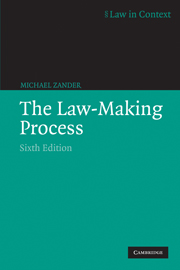Book contents
- Frontmatter
- Contents
- Preface to the sixth edition
- Preface to the first edition
- Acknowledgments
- Books, pamphlets, memoranda and articles excerpted
- Table of cases
- 1 Legislation – the Whitehall stage
- 2 Legislation – the Westminster stage
- 3 Statutory interpretation
- 4 Binding precedent – the doctrine of stare decisis
- 5 How precedent works
- 6 Law reporting
- 7 The nature of the judicial role in law-making
- 8 Other sources of law
- 9 The process of law reform
- Index
4 - Binding precedent – the doctrine of stare decisis
- Frontmatter
- Contents
- Preface to the sixth edition
- Preface to the first edition
- Acknowledgments
- Books, pamphlets, memoranda and articles excerpted
- Table of cases
- 1 Legislation – the Whitehall stage
- 2 Legislation – the Westminster stage
- 3 Statutory interpretation
- 4 Binding precedent – the doctrine of stare decisis
- 5 How precedent works
- 6 Law reporting
- 7 The nature of the judicial role in law-making
- 8 Other sources of law
- 9 The process of law reform
- Index
Summary
It is difficult to conceive of a legal system in which precedent plays no part at all. One of the fundamental characteristics of law is the objective that like cases should be treated alike. It is therefore natural that other things being equal one court should follow the decision of another where the facts appear to be similar. But in the common law systems precedents have a greater potency than simply as models for imitation. The rules require that in certain circumstances a decision be followed whether the second court approves of the precedent or not. Thus in Re Schweppes Ltd's Agreement [1965] 1 All ER 195, the Court of Appeal, with Willmer LJ dissenting, ordered discovery of documents in a case involving restrictive trade practices. On the same day the same three judges gave judgment in a second case involving the same point – Re Automatic Telephone and Electric Co. Ltd's Agreement [1965] 1 All ER 206. Judgment in the second case was delivered by Lord Justice Willmer who simply said: ‘If the matter were res integra, I should have been disposed to dismiss the appeal in this case for the same reasons as those which I gave in my judgment in the previous case. It seems to me, however, that I am now bound by the decision of the majority in the previous case. In these circumstances, I have no alternative but to concur in saying that the appeal in the present case should be allowed.’
- Type
- Chapter
- Information
- The Law-Making Process , pp. 215 - 264Publisher: Cambridge University PressPrint publication year: 2004
- 1
- Cited by



